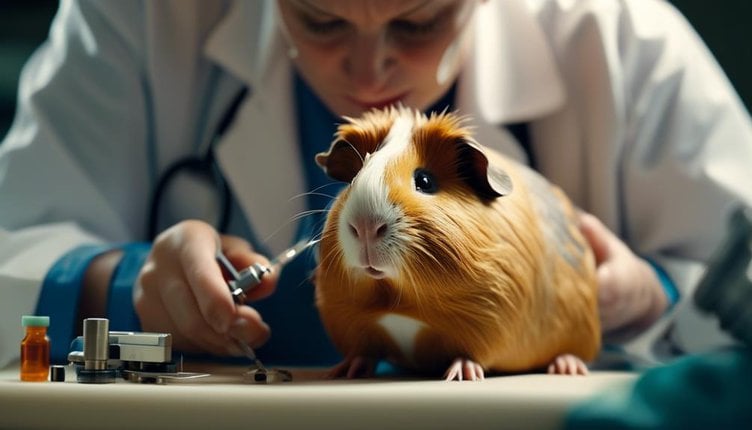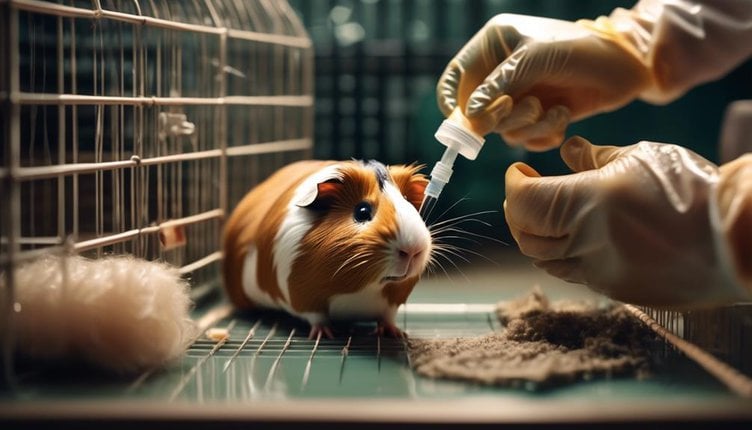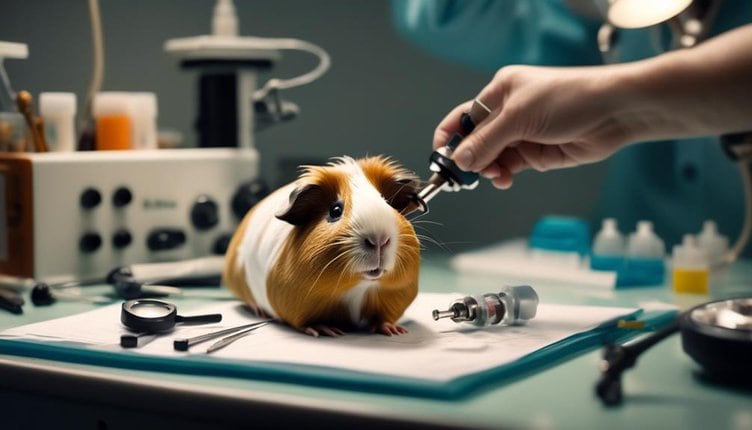Hey there, guinea pig lovers! Are you ready to dive into the fascinating world of parasitic infestations in these adorable furry companions? Well, buckle up because we're about to embark on an epic journey of prevention and treatment that will ensure your little bundles of joy stay healthy and happy!
Now, let's talk about these unwelcome intruders that can cause quite a ruckus in our guinea pigs' lives. Yep, I'm talking about parasites. Just like those uninvited guests who overstay their welcome, these tiny troublemakers can wreak havoc on our beloved pets. But fret not, my friends, because we've got some killer strategies to keep them at bay!
First things first, prevention is key! It's always better to stop these pesky parasites from infesting your guinea pigs in the first place. So, how do we do that? Well, here are a few tips to keep in mind:
1️⃣ Keep it clean: Maintaining a clean and hygienic living environment for your guinea pigs is crucial. Regularly clean their cages, bedding, and accessories. Trust me, a clean space is a parasite-free space!
2️⃣ Quarantine protocol: If you're introducing a new guinea pig into your family, make sure to quarantine them for a while. This will help prevent any potential spread of parasites to your existing furry friends. Safety first, folks!
3️⃣ Vet visits are a must: Regular check-ups with your trusted veterinarian are vital. They can assess your guinea pigs' health and provide appropriate preventive treatments to keep those parasites at bay.
Alright, now let's talk about the nitty-gritty of treatment. If, despite your best efforts, your guinea pig falls victim to a parasitic infestation, don't panic! We've got your back with some effective treatment options:
1️⃣ Medications: Your vet may prescribe specific medications to combat those pesky parasites. Follow their instructions diligently and administer the medication as directed. Remember, consistency is key!
2️⃣ Quarantine round two: If you have multiple guinea pigs, consider separating the affected one from the rest. This will help prevent the spread of parasites to others while you tackle the infestation head-on.
3️⃣ Environmental clean-up: Don't forget to thoroughly clean and disinfect your guinea pigs' living space. This will help eliminate any lingering parasites and prevent reinfestation. Cleanliness is your secret weapon!
So there you have it, guinea pig enthusiasts! Armed with these prevention and treatment strategies, you can ensure a parasite-free paradise for your furry friends. Remember, keeping your guinea pigs healthy and happy is the ultimate goal, and with a little effort, you can make it happen!
Now go forth and enjoy the cuddles and playtime with your guinea pigs, knowing that you've got their back against those pesky parasites. You're a superhero in their eyes!
Key Takeaways
- Maintaining a clean and hygienic living environment for guinea pigs is crucial in preventing parasitic infestations.
- Regular veterinary check-ups and preventive treatments can help in preventing infestations.
- Promptly addressing any symptoms of infestations, such as hair loss and excessive itching, is important for early detection and treatment.
- Understanding the types of parasites that can affect guinea pigs and their life cycles can aid in prevention and treatment strategies.
Types of Parasites in Guinea Pigs
Guinea pigs can be affected by various types of parasites, which can cause significant health issues if left untreated. It's important for guinea pig owners to be aware of the different parasites that can infest their pets.
One common type of parasite that affects guinea pigs is mites. These microscopic creatures can cause intense itching and discomfort for the guinea pig.
Another type of parasite is lice, which can be transmitted from one guinea pig to another through direct contact. These parasites can multiply rapidly and cause skin irritation and hair loss in affected guinea pigs.
Additionally, guinea pigs can also be infested with fleas, which can be brought into the environment by other pets or through contact with infested areas. Fleas can cause severe itching and allergic reactions in guinea pigs.
It's important to understand the life cycle of these parasites and their transmission methods in order to effectively prevent and treat infestations in guinea pigs.
Regular veterinary check-ups, proper hygiene practices, and keeping guinea pigs in clean environments can help prevent these parasites from infesting guinea pigs and causing health issues.
Recognizing the Symptoms of Infestations
After learning about the various types of parasites that can infest guinea pigs, it's crucial to be able to recognize the symptoms of infestations in order to address them promptly and effectively. Guinea pigs can display a range of signs when they've a parasitic infestation. Here are some key symptoms to look out for:
- Hair loss: Parasites like mites can cause hair loss in guinea pigs. Pay attention to any bald patches or thinning of fur.
- Scratching and itching: Guinea pigs may constantly scratch themselves or exhibit excessive itching when they've parasites. This behavior is often accompanied by redness or irritation of the skin.
- Presence of visible parasites: In some cases, you may be able to see the parasites on the guinea pig's skin or fur. Take note of any ticks, fleas, or lice that you spot during grooming.
Diagnosing a parasitic infestation in guinea pigs requires a thorough examination by a veterinarian. They may perform skin scrapings or use a microscope to identify the specific parasite causing the infestation. It's important to consult a professional for an accurate diagnosis and appropriate treatment plan.
Early detection and treatment can help alleviate discomfort and prevent further complications for your beloved guinea pig.
Importance of Regular Health Check-ups

Regular health check-ups are essential for maintaining the well-being of guinea pigs and ensuring early detection of any potential health issues. Just like humans, guinea pigs can develop various health problems that may go unnoticed without regular veterinary care. By scheduling regular check-ups, guinea pig owners can provide their furry friends with the necessary preventive care and promptly address any emerging health concerns.
The importance of veterinary care cannot be overstated. Guinea pigs are prone to a range of health issues, including respiratory infections, dental problems, and parasitic infestations. Regular check-ups allow veterinarians to assess the overall health of the guinea pig, monitor their weight, examine their teeth and nails, and check for any signs of illness or discomfort. Early detection and intervention are crucial in preventing minor health issues from escalating into more serious conditions.
To emphasize the significance of regular health check-ups, the following table highlights some common health problems that guinea pigs may experience and the benefits of early detection and intervention:
| Health Problem | Early Detection and Intervention |
|---|---|
| Respiratory infection | Prompt treatment can prevent the infection from spreading and causing severe complications. |
| Dental problems | Early intervention can prevent pain, difficulty eating, and potential tooth loss. |
| Parasitic infestations | Timely treatment can eliminate parasites and prevent further health issues. |
| Skin infections | Early detection allows for prompt treatment and prevents the spread of infection. |
Preventative Measures for Parasitic Infestations
To ensure the well-being of guinea pigs and reduce the risk of parasitic infestations, implementing preventative measures is essential. By taking these measures, guinea pig owners can protect their furry friends from the discomfort and potential health complications caused by parasitic infestations.
Here are some effective ways to prevent parasitic infestations in guinea pigs:
- Regularly clean and disinfect the guinea pig's cage: Maintaining a clean and hygienic living environment is crucial in preventing parasitic infestations. Regularly clean the cage, removing any soiled bedding or droppings, and disinfect it using a pet-safe cleaner.
- Provide a balanced and nutritious diet: A healthy guinea pig is less susceptible to parasitic infestations. Ensure that your guinea pig's diet is well-balanced, consisting of fresh vegetables, hay, and high-quality pellets. A balanced diet helps boost the guinea pig's immune system, making them more resilient to parasites.
- Use natural remedies: Some natural remedies can help repel or control parasites. For example, adding apple cider vinegar to the guinea pig's water can prevent fleas and mites. Additionally, neem oil or diatomaceous earth can be used as natural insecticides to ward off parasites.
Proper Hygiene and Cage Cleaning

Proper hygiene and regular cage cleaning are essential in preventing parasitic infestations in guinea pigs. It's recommended to clean the cage at least once a week to remove any droppings, urine, and food debris.
Additionally, using appropriate hygiene products, such as pet-safe disinfectants, can help eliminate any potential parasites and maintain a clean and healthy environment for the guinea pig.
Cleaning Frequency
Maintaining a clean and hygienic cage for your guinea pig is essential to prevent parasitic infestations. Proper hygiene maintenance and cleaning techniques play a crucial role in ensuring the well-being of your pet.
Here are some guidelines to help you determine the appropriate cleaning frequency for your guinea pig's cage:
- Daily Spot Cleaning: Remove any soiled bedding, droppings, and uneaten food to prevent the buildup of bacteria and parasites.
- Weekly Deep Cleaning: Completely empty the cage, wash it with warm soapy water, and rinse thoroughly. Allow it to dry before adding fresh bedding and returning your guinea pig.
Hygiene Products
Using appropriate hygiene products is essential for maintaining a clean and healthy environment for your guinea pig. Guinea pig grooming plays a crucial role in parasite prevention, and using the right products can help keep your pet safe.
When it comes to hygiene, it's important to choose products specifically designed for guinea pigs. These include shampoos, conditioners, brushes, and nail clippers. Regularly grooming your guinea pig not only keeps them clean but also allows you to check for any signs of parasites or skin issues.
It's important to follow the instructions on the products and to handle your guinea pig with care during grooming sessions. By incorporating proper hygiene practices and using the right products, you can help prevent parasite infestations and ensure the well-being of your guinea pig.
Effective Treatment Options
There are several effective treatment options available for guinea pig parasitic infestations. When it comes to addressing these infestations, there are two main approaches: using types of medications or opting for natural remedies.
Here are some options to consider:
- Medications: There are various types of medications that can be prescribed by a veterinarian to treat parasitic infestations in guinea pigs. These may include oral medications, topical treatments, or injections. Common medications used to combat parasites include antiparasitic drugs, such as ivermectin or selamectin. These medications work by killing the parasites or inhibiting their ability to reproduce.
- Natural Remedies: Some guinea pig owners prefer to explore natural remedies to treat parasitic infestations. These may include herbal treatments or essential oils that have shown potential in repelling or killing parasites. However, it's important to consult with a veterinarian before using any natural remedies to ensure they're safe and effective for your guinea pig.
- Combination Therapy: In more severe cases, a combination of medications and natural remedies may be recommended. This approach can provide a comprehensive treatment plan that targets parasites effectively and promotes the overall well-being of the guinea pig.
Monitoring and Follow-up Care

Regular monitoring and follow-up care are essential for ensuring the successful management of guinea pig parasitic infestations. After the treatment, it's crucial to implement follow-up procedures and provide post-treatment care to ensure the complete eradication of the parasites and the well-being of the guinea pigs.
Follow-up procedures involve closely monitoring the guinea pigs for any signs of recurring infestations. This includes regular examination of the guinea pig's skin, fur, and overall health. It's important to check for any new signs of infestation, such as itching, hair loss, or the presence of parasites. If any suspicious symptoms are detected, immediate action should be taken to treat the guinea pigs.
Post-treatment care is equally important to prevent re-infestation and promote the guinea pig's recovery. This involves maintaining a clean and hygienic living environment for the guinea pigs, regularly cleaning their cages, bedding, and accessories. Additionally, providing a balanced diet and ensuring the guinea pigs receive proper nutrition and hydration is vital for their overall health and immune system.
Regular veterinary check-ups should be scheduled to assess the guinea pigs' progress and address any concerns or complications that may arise. By adhering to these follow-up procedures and providing post-treatment care, the guinea pigs will have the best chances of staying healthy and free from parasitic infestations.
Frequently Asked Questions
Can Guinea Pigs Get Parasites From Other Animals?
Guinea pigs can contract parasites from other animals through direct contact or exposure to contaminated environments. Common parasites in guinea pigs include mites, lice, and fleas. Proper prevention and treatment methods can help protect guinea pigs from these infestations.
How Often Should I Clean My Guinea Pig's Cage to Prevent Parasitic Infestations?
To prevent parasitic infestations in guinea pigs, it is important to clean their cage regularly. The recommended frequency for cleaning a guinea pig's cage is [insert recommended frequency here]. Following this practice will help keep your guinea pig healthy and free from parasites.
Are There Any Natural Remedies or Home Remedies I Can Use to Treat Parasitic Infestations in Guinea Pigs?
There are some natural and home remedies that can be used to treat parasitic infestations in guinea pigs. These remedies can be effective in reducing the parasites and providing relief for the guinea pigs.
Can Guinea Pigs Develop Immunity to Parasites Over Time?
Over time, guinea pigs can develop some level of immunity to parasites. However, the long-term effects of parasitic infestations on guinea pigs can still be detrimental to their health and well-being.
How Long Does It Usually Take for a Guinea Pig to Recover From a Parasitic Infestation With Proper Treatment?
Recovery time from a parasitic infestation in guinea pigs varies depending on the type of parasite and the effectiveness of the treatment. With proper treatment, it usually takes a few weeks for a guinea pig to fully recover.





